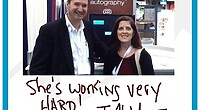
In the minds of readers, the genre of memoir may have once been reserved for noteworthy people, full and lofty tomes that were written about one’s rise to the upper echelon of whatever excellence had been achieved. But as more and more readers clamor for tales of ordinary-yet-interesting people, whether they have gained notoriety or not, memoir has become a widely popular genre.
One interesting aspect of digital publishing is its obvious applications to any writer who wishes to put her work in front of a reading public, and that key characteristic has grown to include self-published memoir writers. No longer relegated just to the former Presidents or corporate CEOs, memoir writers are now simply any author with an interesting story to tell. Digital publishing is opening doors to putting those books into the hands of an avid audience.
Interestingly, more and more memoir authors are discovering the viable market for their works from the vantage point of people who want to know more about the process of overcoming serious obstacles. Writers are finding not only the healing process that comes in the form of writing a first-person account of childhood abuse, the labyrinth of mental illness, or overcoming a physical handicap to achieve a level of normalcy in life, they are also discovering an audience of readers who are hungry for these veritable survivor stories. And multitudes of those readers are grateful for the authors’ works.
GoodEReader.com spoke to teacher, editor, and author Cyndy Drew Etler about a work she has recently completed in which describes in horrifically accurate detail the undeniably true account of physical and mental abuse that took place while she was in a government-supported drug rehabilitation program aimed at reforming troubled teens. While Etler still has to decide which route she may opt to pursue for publication, knowing that digital publishing to ebook was available to her helped her see the point in reliving the mental torture of that time in her life. The completion of that memoir has led to an interview on Mark Levine’s recent radio program and an ability to provide some semblance of help to others in the survivor’s support group which Etler belongs to.
“I was getting up at 4:30 in the morning to write and it was the best I’ve felt in a long time,” says Etler of the process of writing this memoir. “I wrote almost every day, and on the days I couldn’t write I just dragged. When I reached the point in the book that was really the downturn in the story, I was stuck for the longest time trying to write the scenes because I couldn’t make myself do it. I had to physically put myself in a closet in my home and type the words. That dislodging of those scenes really tapped into an alternate sense of healing.
“I’m free of this, but so many survivors of this program don’t have that ability and desire to put the words on paper and get them out. I can describe the horrors of this program because I have re-experienced them as I wrote the book. Writing the book in the first person was my attempt to try to help people actually live it in print. That’s why it’s been so healing for me; I’m making the reader live through my experience on the page.”
While Etler is still considering publishing options, there has arguably never been a more productive time for authors and for readers given the ease of digital publishing. As more writers come forward with their memoirs, more audiences may find the sense of healing and community that comes from reading titles from authors who have successfully overcome their experiences.
Mercy Pilkington is a Senior Editor for Good e-Reader. She is also the CEO and founder of a hybrid publishing and consulting company.
